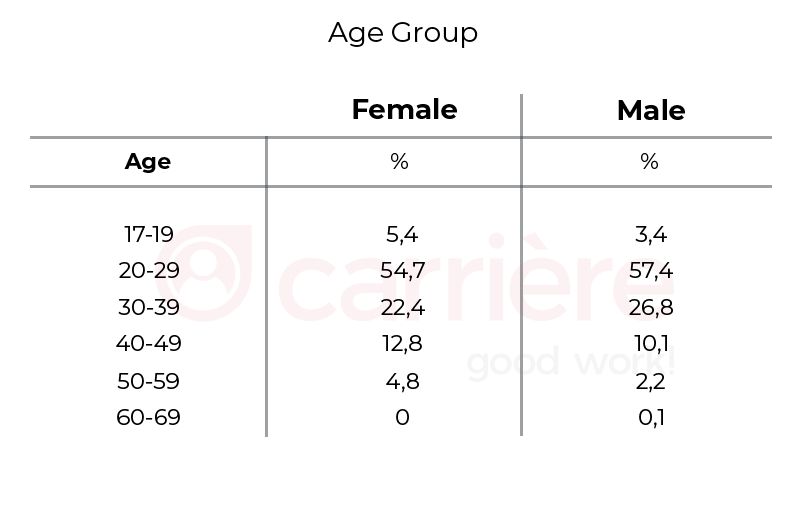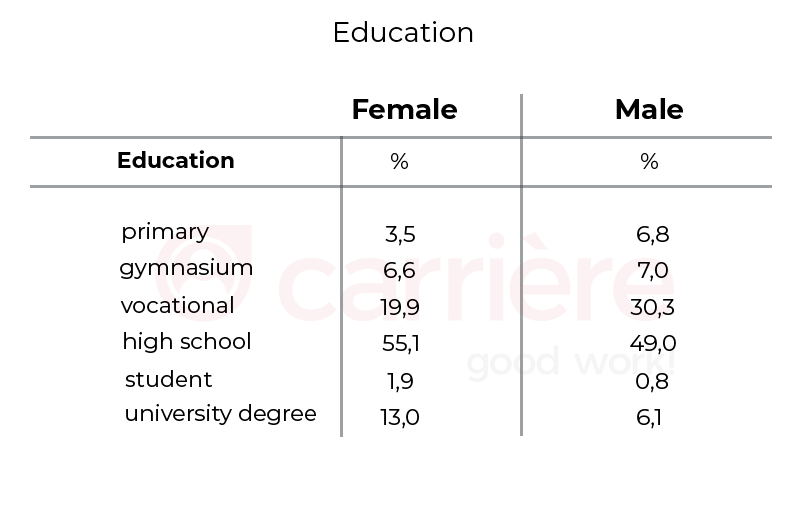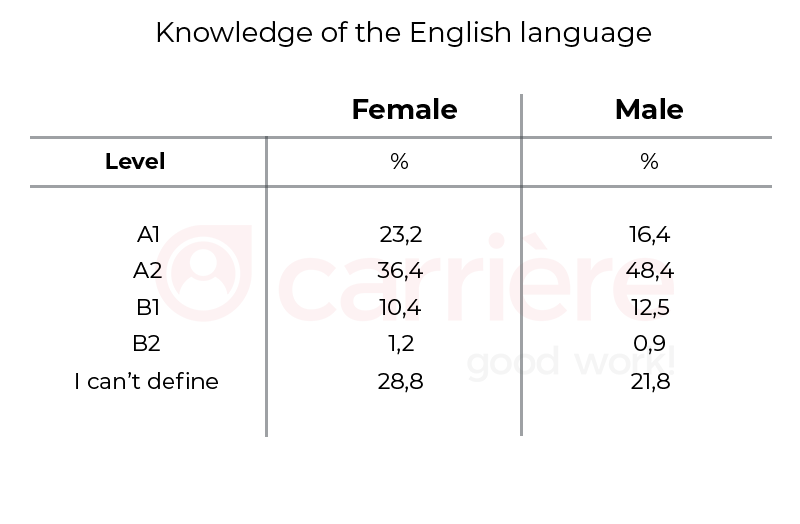Despite the Covid-19 outbreak that has lasted for over a year, the demand for temporary workers in some European countries continues to grow. We present the report of Carrière (previously Holland Contracting) agency on the characteristics of Polish economic migrants in the Netherlands.
The Netherlands has for years remained in the top three of the most popular European countries chosen by Poles as a place for economic migration.
According to the Central Statistical Office, 135,000 of our compatriots were temporarily staying in the Netherlands at the end of 2020. This is 10,000 more than the year before. The increased interest in working abroad was certainly influenced by the coronavirus pandemic, which painfully affected such sectors of the Polish economy as manufacturing, trade, catering and tourism. It is in these industries that people without qualifications, experience in the labour market or looking for seasonal work are most often employed.
Which group of Poles have most often decided to go to work in the Netherlands in the last 12 months? Here is a report on Polish economic migrants.
Young Poles more often decide to migrate for work
Data collected by the Carrière Agency shows that over the past year the largest group of Poles emigrating to the Netherlands for work were between 20 and 29 years of age.


The average age in this group was 23.6 years for women and 24.8 years for men. This is in line with Eurostat data, which show that during lockdown the unemployment rate among young Poles rose from 9.6% to 14.8%, i.e. by 5.2 percentage points. This is the third fastest growth rate in the entire European Union, after Spain and Estonia.
This is a direct result of the fact that young people with no experience are far more likely to be employed in tourism, catering or manufacturing, sectors that have been hardest hit by the pandemic.
In addition, the younger generation very often works on commission or fixed-term contracts, so employers find it easiest to terminate their relationship with them. All this has led young people to seek gainful employment outside Poland, including in the Netherlands.


The profile of a candidate looking for work in the Netherlands has changed dramatically over the last 10 years. This has, of course, been influenced by the opening of borders or by changing economic factors – above all, for the Poles. Currently, applicants are mainly young people. Not infrequently speaking English. The range of offers for such people is huge and very varied.Katarzyna Wilk
Head Manager at Carrière
50+ employees in minority
It is worth noting that the smallest group of Poles leaving were those aged over 50. In the past year, only 2.3% of men and 4.8% of women have chosen to work in the Netherlands. Perhaps the coronavirus pandemic had a big impact on that. Some people considering economic migration, due to restrictions and fear of infection, decided not to leave Poland.
Moreover, with the outbreak, many people decided to return from the Netherlands and wait out the uncertain times back home. A significant proportion of middle-aged people were employed in horticulture or agriculture. All this meant that these very industries in the Netherlands have been hit particularly hard by the lack of Polish economic migrants.


What education do people who go to work in the Netherlands have?
The data collected shows that most Poles going to work in the Netherlands have a secondary education. More than half of the women (55.1%) and 49% of the men completed high school or technical school. Every 5th Polish woman and every 3rd Pole finished their education at a vocational school.
What about people with higher education? As many as 13% of women and 6% of men looking for work in the Netherlands had a university degree. The smallest group of people leaving in the last 12 months were students.

How well do Polish economic migrants speak English?
A report by Carrière shows that the majority of people choosing to work in the Netherlands speak English at A2 level, which is basic. They are able to communicate in everyday life and know the basic vocabulary they need for their work. Only 1% of migrating Poles have an advanced command of a foreign language.
Does this mean that without knowledge of English you cannot find a job in the Netherlands? For 52% of women and 38% of men, poor knowledge of a foreign language or a complete lack of it was not an obstacle to taking up employment. Such people have found work in greenhouses, food processing plants and in production halls.


Why are there such a large number of people who are unable to assess their level of English?A lot of people still know English from school. Many candidates, having not used the language for years, remember little of it. Nobody has tested them linguistically for a long time. On the other hand, many candidates have a mental block. In my work, I come across candidates who enter basic knowledge of a foreign language on the registration form and then refuse to say a single sentence in subsequent interviews. They feel blocked when speaking but declare that they understand the basics, they just don’t know how to respond.
Katarzyna Kędryna
HR Manager at Carrière
Leaving together or alone?
Among those looking for work in the Netherlands, as many as 63% of Poles decided to go alone. Only 3 out of 10 men travelled to work together with a relative or friend. Polish women were more assertive in this field. Almost half, 46%, travelled for work with another person. This result explains the interest in job offers for couples in the Netherlands which has been growing for some time.


Why is there a growing interest in jobs abroad for couples?A trip for two gives those leaving a sense of security. The knowledge that by going with someone you know, in case of unforeseen situations, it will be easier to cope. “Together we will find a solution.” Another group of people going to work in the Netherlands are couples who start a new life together. They migrate for a specific purpose – to earn money for a wedding, a flat, a holiday together, etc.
Katarzyna Kędryna
HR Manager at Carrière
Is category B driving license necessary in the Netherlands?
The data collected shows that only ¼ of the women and ⅓ of the men who migrate to the Netherlands for work have a category B driving licence. These are quite surprising results, as it would seem that most of today’s 20- or 30-year-olds are licensed to drive a passenger car. What’s more, some employers in the Netherlands require both a category B driving license, as well as one for forklift trucks. In addition, if a longer commute is required, the car is the most convenient means of transport.


Despite being authorised to drive, as many as 15% of women and 6.6% of men declared no desire to use the employment agency’s fleet of cars. It is very possible that these people were afraid of the material responsibility for the car entrusted to them. However, this is not a problem at all, as a good agency makes sure that each accommodation has at least one active driver. Moreover, such a person receives additional remuneration for this.
Characteristics of Polish economic emigrants in the Netherlands – summary
One of the favourite destinations of Polish economic migrants is the Netherlands. Most often, the young generation of Poles who still have little work experience and therefore no prospects for decent financial conditions on their home labour market decide to go to work in the Netherlands.
Based on data collected by the Carrière Agency (Holland Contracting), the statistical Pole going to work in the Netherlands over the past year is a young man under 30 years of age. Mostly a high school or technical school graduate. He speaks English communicatively enough to understand the instructions of his foreign superiors. He chooses to go to work without friends or family members. He also does not have a category B driving licence, but is willing to work, even if it is physically demanding.
And the Netherlands is increasingly in need of manpower. This is influenced by the rapid ageing of the Dutch population. A study conducted by the Dutch Demographic Institute with the cooperation of the Netherlands Bureau of Statistics (CBS) shows that the number of citizens over 80 will triple in the Netherlands by 2050. Consequently, the working population will shrink from 46 to 41-44% in 2050.
Already, labour migrants are needed in more and more sectors of the Dutch economy. Year on year, the job opportunities for them are expanding, especially in the food logistics and e-commerce sectors.
How has the pandemic changed the temporary work market in the Netherlands?
The pandemic was a difficult and challenging time for both employment agencies and Dutch employers. In order to ensure work safety, special procedures had to be put in place, as well as a quarantine for people coming to the Netherlands. Fortunately, our employees were able to adapt perfectly to the new situation. Instead, companies in the Netherlands have realised that they need to work harder to attract workers from outside their country. According to the announcements, from next year, among other things, the period of phase A will be shortened.
The plans for the coming years also include a significant increase in the minimum wage.Katarzyna Wilk
Head Manager at Carrière
Shortage occupations in the Netherlands
According to a report by the Dutch government agency UVW, which deals with the unemployed and those seeking employment, the coronavirus pandemic has significantly changed the labour market in the Netherlands. In its report from November this year UVW describes a clear correlation between the state of the national economy and the demand for temporary workers.
During the global lockdown, many employers significantly reduced or suspended their operations. Companies kept on only permanent workers, those on long-term contracts. Thus, the demand for temporary workers decreased.
In May this year, with the recovery of the Dutch economy, the demand for seasonal workers increased again. As the economy continues to grow, UVW also forecasts increased demand for permanent workers. According to data from November this year, industries related to construction, communications, industry and also mineral extraction are currently in huge demand. Following the end of the lockdown, the catering industry has also had its five minutes and is now trying to make up for months of losses. Dutch greenhouse and orchard owners are also complaining about staff shortages.
Are there any trends currently noticeable among job seekers?
At the moment, the range of job opportunities is so diverse that there is something for everyone. The key to the popularity of a job is simply that it pays well. For some it will be sorting and packing peppers (from March to November), for others it will be collecting orders in distribution centres, where the work is all year round. The sorting of flower bulbs in the October-December period also remains popular.Katarzyna Wilk
Head Manager at Carrière
What professions are currently most in demand in the Netherlands?
All technical professions are in great demand in the Netherlands. Installers, specialists in renewable energy sources or energy-efficient construction are highly sought after by employers.
In turn, the coronavirus pandemic has increased demand among the medical profession. Doctors and nurses trained to work in intensive care units, psychiatrists and psychologists continue to be most in demand. Due to the growth of the e-commerce industry, more and more offers are also appearing for warehouse logistics and transport specialists.
Here is a list of the most sought-after professions in the Netherlands:
- Electricians
- fitters of power and energy installations
- installers of air conditioning, ventilation and refrigeration systems
- energy network maintenance specialists
- control systems specialists
- safety systems installers
- telecommunications and fibre-optic systems fitters (Internet infrastructure)
- electrical installation inspectors
- telecommunications specialists
- plumbers
- agricultural and industrial machinery and equipment mechanics
- construction engineers
- medical personnel: doctors, nurses, psychologists, home care workers
- specialists in virtual warehouse management, supply chain management
- team-leaders (employee team leaders) in large chains such as DHL, IKEA and Jumbo.
About the report
This report is based on a research sample of 1396 people of Polish nationality, including 913 men and 483 women, who decided to use the intermediation of the employment agency Carrière (Holland Contracting). The data is from 27 October 2020 to 27 October 2021 and concerns persons employed in the Netherlands.


About Carrière
Carrière is one of the fastest-growing temporary employment agencies in the Netherlands. It has been present in Eastern European countries since 2020, when it acquired Holland Contracting Group.
The company has an extensive portfolio of job offers abroad in industries such as transport, logistics, manufacturing, horticulture or agriculture. To date, the agency has had over 94,000 job offers, which have brought thousands of Polish workers closer to fulfilling their dreams.
Sources:
- GUS (Central Statistical Office), Informacja o rozmiarach i kierunkach czasowej emigracji z Polski w latach 2004-2020
- GUS, Wybrane aspekty rynku pracy w Polsce. Aktywność ekonomiczna ludności przed i w czasie pandemii COVID-19
- GUS, Bezrobocie rejestrowane. I-II kwartał 2021 roku
- PAP (Polish Press Agency), Media w Holandii: coraz mniej chętnych z Europy Wschodniej do pracy w rolnictwie i ogrodnictwie
- EURES, Analysis of shortage and surplus occupations 2020
- UVW, Duiding arbeidsmarktontwikkelingen- November 2021
- Freepik.com

















